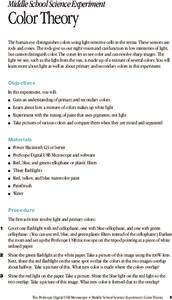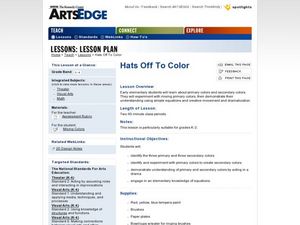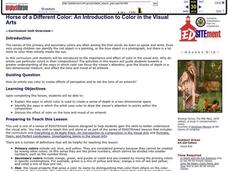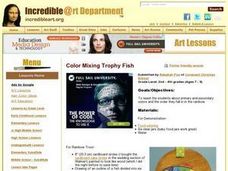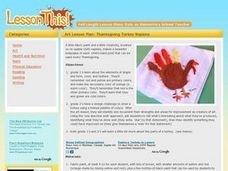National Gallery of Canada
My Treehouse
If you could build your own treehouse, what would it look like? Using a piece of contemporary art as inspiration, learners draw their own treehouses and add geometric and organic shapes. The instructional activity touches on Visual...
Art Institute of Chicago
Color Combinations
Explore color through an examination of pointillism and light. Class members view Georges Seraut's famous painting on a computer, zooming in and out to see the details and effects of the technique. They then cover how light and color are...
Curated OER
Shaping the Color Wheel
When you paint you almost always use color. Budding artists explore the color wheel, color vocabulary, and painting techniques. They discuss and practice mixing colors, then paint a color wheel for personal reference.
Curated OER
Color the Snow
Are your teaching in a cold and snowy environment? If so, then try out this fun activity with your class. You mix a variety of colors in large jars to show learners the difference between primary and secondary colors, then let them mix...
Curated OER
Colors, Colors Everywhere
Students mix red, yellow, and blue frosting together to produce secondary colors. Pupils are shown that all colors are made from mixing primary colors of paint together. They discuss the color wheel and spread the "paint" icing on...
Curated OER
Color Theory
Students are able to gain an understanding of primary and secondary colors. They are able to explore about how a mixture of colors makes up white light. Students are able to experiment with the mixing of paint that uses pigments, not...
Oglebay Institute
Post-Impressionism: Pointillism
How can little dots in two colors make a third color? Experiment with pointillism and color mixing with a series of activities. After viewing paintings by Seurat and watching a teacher demonstration, pupils create samples of three...
Curated OER
The Purple Cow
Students read and discuss the poem, The Purple Cow. In this poetry lesson, students discuss the rhyming words in the poem and why this piece of literature is silly or unusual.
Curated OER
Mixing Colors with Corn Syrup and Food Coloring
Anyone who has worked with small children know that color identification and color mixing can be fun! This simple idea has a lot of potential. It suggests to mix food coloring with corn syrup to provide an opportunity for color mixing...
Curated OER
The Color Wheel
Hand out this nifty resource to make your next lesson on the color wheel a snap. It is a picture of the color wheel alongside a description of primary, secondary, and mixing colors. Great for artists of any age.
Curated OER
Counting Coloring Puzzle
If your kids enjoy color-by-number, they will be excited about this worksheet! Using a color key, they match numbers on a picture of a bee by coloring them the corresponding shade. There is a trick here: although the number 10 is listed...
Curated OER
Color Theory
Sixth graders explore the basics of color mixing with paint by creating secondary and tertiary colors. Individually, 6th graders create their own paintings based on a popular series of sculptures.
Curated OER
Do You Know Your Colors?
Red, yellow, green, and blue are such wonderful colors. Introduce your littlest learners to the color names, where they are commonly found, and how they can be mixed or made. A highly visual presentation that shows its colors.
Curated OER
Color Theory & Using Layers
Students investigate the color wheel theory and incorporate it into simple sketches on their handheld. The importance of the use of layering and the difference between primary, secondary, and tertiary colors is presented in this lesson.
Curated OER
What is It? Susie Sees!
Students explore the five senses. For this cross curriculum five senses lesson, students view an "I Can See Colors" PowerPoint presentation and sort items by color and shape. Students mix primary color paints to create secondary...
Curated OER
Hats Off to Color
Students investigate primary and secondary colors. In this art lesson, students mix primary paint colors to develop secondary colors. Students identify each color they created.
Curated OER
Exploring Neighborhoods through Art
Students explore neighborhoods. In this color and social studies cross-curriculum instructional activity, students listen to Harold and the Purple Crayon by Crockett Johnson, then compare and contrast neighborhoods. Students mix primary...
Curated OER
Colors
Students learn about the Impressionist painters' use of color and how it connected to early nineteenth century scientific theories about color. In this colors lesson plan, students explore combinations of primary and secondary colors,...
Curated OER
Mixing the Sea
Students explore and experience mixing primary colors to create secondary colors and how to create tonal effects by adding white or black to the mix. They discuss color "temperatures" and form opinions about the works of Monet as well as...
Curated OER
Color Mixing Cookie Exercise
Sixth graders explore how primary colors create secondary colors. They incorporate their knowledge of primary and secondary colors by creating various colors of frosting. Given the cookie shape, they complete a decoration plan for...
Curated OER
Horse of a Different Color: An Introduction to Color in the Visual Arts
Young scholars examine how artists use color to create a sense of depth in a two-dimensional space. They view and analyze prints, complete worksheets, and write a paragraph on how color is used to draw the viewer's eye to a central figure.
Curated OER
Primary Color Mixing
Third graders identify secondary colors that are created by mixing primary color paint combinations, and make paintings of their own.
Curated OER
Color Mixing Trophy Fish
Students compare colors. In this color lesson, students determine which colors are primary and which are secondary. Students investigate rainbows and create a piece of art organizing colors as they appear in a rainbow.
Curated OER
Thanksgiving Turkey Napkins
Learners explore painting. In this Thanksgiving art lesson, students trace their hands on 4 cloth napkins sent from home and use fabric paint to decorate them as hand print turkeys.







